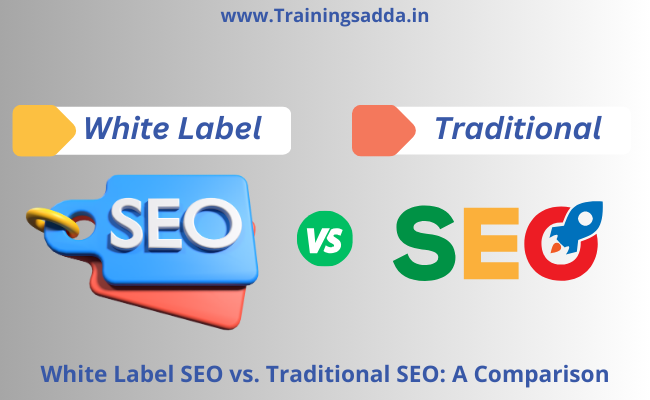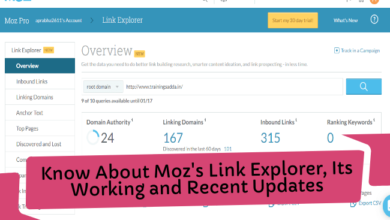White Label SEO vs. Traditional SEO: A Comparison

In the rapidly evolving world of computers, there is fierce competition for online perceivability. Website optimisation, or site improvement, is nevertheless a powerful tool in this arsenal, and businesses must decide between two distinct approaches: White Label SEO Vs. Traditional SEO.
This blog takes a comprehensive approach, hoping to provide a thorough understanding of different approaches and their specialists, with the ultimate goal of assisting organisations in making decisions that are in keeping with their evolving needs and goals.
Table of Contents
What is White Label SEO?
Often called Private Label SEO, White Label SEO is a collaborative business model where companies hire outside service providers to manage their SEO requirements. Resellers serve as go-betweens, keeping clients informed while using outside experts’ knowledge to provide SEO services under their own brand.
This strategy promotes cooperation between organizations in the digital marketing ecosystem by enabling companies to provide complete SEO solutions without requiring an internal workforce. Now, you know white label SEO meaning, let’s move forward.
Learn more: SEO Vs. PPC – What Will Bring You More ROI?
White Label SEO’s Benefits:
- Scalability and Flexibility: White Label SEO’s natural capacity to grow operations without interruption is one of its main advantages. Resellers can access a large pool of qualified experts offered by the SEO service provider as client demands fluctuate. Agencies can satisfy expanding client needs thanks to this scalability without sacrificing the caliber of their services. Flexibility is another critical benefit; by utilizing the varied skill sets of outside specialists, resellers may adjust to changing client demands and industry trends.
- Emphasis on Core Competencies: Companies can shift their attention to core competencies without compromising the caliber of their SEO offerings by using White Label arrangements to outsource SEO services. Businesses can more effectively deploy resources and streamline their operations with this method. Companies can focus on improving their core offerings rather than spending money on hiring and supervising an internal SEO team. This strategic alignment ensures that the difficulties of managing an SEO staff don’t overshadow the company’s key competencies, resulting in a more effective and productive overall operation.
- Cost-Effective: White Label SEO audit tool is a financially sound option, especially for smaller companies. Companies can strategically manage resources by paying for specific services rather than incurring the costs of employing and training an internal team. With this affordable model, companies can guarantee that their consumers receive excellent SEO services without exceeding budget. White Label SEO reporting gives businesses the choice to select services according to their budgetary limits, which makes it a desirable alternative for agencies with narrow profit margins.
Understanding Traditional SEO:
Conventional SEO entails doing all SEO-related tasks internally within a company or agency. Building an internal team of SEO experts, strategists, and content producers is necessary for this strategy to develop and carry out thorough SEO plans.
Benefits of Traditional SEO
- Total Control: Giving businesses total control over the SEO process is one of the main benefits of traditional SEO. Businesses may carefully adjust their SEO efforts to match their needs and objectives, from strategy development to execution and ongoing monitoring. Businesses with distinctive needs or those in distinct industries will find this degree of control very beneficial. The ability to manage every facet of the SEO strategy enables a customized and optimized approach, guaranteeing that the business’s goals and vision are effectively included in the SEO campaigns.
- Comprehensive Knowledge of the Brand and Industry: One benefit of traditional SEO is that its internal team has a profound grasp of the company’s culture, the brand, and the industry. The SEO team’s deep understanding enables them to create strategies that perfectly complement the company’s distinctive qualities. The internal team fully integrates into the brand’s culture, which helps them produce content and execute tactics that satisfy search engine optimization needs and appeal to the intended audience.
- Immediate Communication: One of Traditional SEO’s main advantages is its direct and immediate communication. The internal structure makes it easier for the SEO team to work seamlessly with other pertinent organizational divisions and make decisions quickly. This real-time communication is essential to adjust to changes quickly, deal with obstacles as they arise, and guarantee a compelling approach to the entire marketing plan.
What is the difference between White Label SEO and Traditional SEO?
Expertise and Specialisation: White Label SEO excels in knowledge and specialization by utilizing the abilities of outside experts. These experts give a depth of expertise that may exceed that of an internal team because of their varied experiences and insights. This outside viewpoint can be helpful when implementing creative tactics and remaining current with it.
Contrarily, traditional SEO depends on the knowledge of the internal team, which, although closely associated with the brand, might not have as much exposure to a wide range of industry environments. The company’s decision between these models is based on the harmony it aims to achieve between internal brand-centric knowledge and specialized outside viewpoints.
Flexibility and Scalability: White Label SEO offers organizations unparalleled flexibility and scalability, enabling them to adjust quickly to shifting market conditions and rising customer expectations. Because it depends on outside specialists, it can react quickly to changes in workload, which is perfect for agencies with varying amounts of business.
Conversely, traditional SEO may encounter scaling issues due to internal resource constraints. Although it gives control, the internal team’s capability may limit this control.
Traditional SEO’s scalability may make it necessary to make significant investments in recruiting and training new employees, which makes it a more challenging strategy for companies with unpredictable workloads or quick growth.
Cost considerations: Depending on the size and structure of the company, White Label SEO and Traditional SEO have different costs. White-label SEO is typically more affordable because it enables smaller firms to acquire specialized services without incurring the overhead costs of having an in-house team.
White Label SEO’s pay-as-you-go strategy guarantees that companies only pay for their required services, offering a more predictable and controllable cost structure.
Larger businesses with ongoing and intensive SEO needs may find that traditional SEO results in longer-term cost savings despite the more significant upfront costs associated with hiring and training staff. As a result, the cost factors must align with the company’s projected growth and current financial constraints.
Relationships with Clients: White Label SEO uses the reseller as an intermediary, looking after client relations on the provider’s behalf. As the reseller acts as the client’s sole point of contact, this may facilitate communication.
The resellers’ and the external SEO providers’ seamless coordination guarantees efficient communication of expectations and timely fulfillment of client needs. Conventional SEO, on the other hand, facilitates direct client engagement and builds close, instantaneous ties.
By being more direct with their communication, businesses can forge closer bonds with their customers, quickly resolve issues, and adjust their approach. However, because different departments inside the company may communicate differently, it could also make it difficult to manage client expectations properly.
Know the: 10 Digital Marketing Tools to Upscale a New Business
Final Words
In summary, the decision between White Label SEO and Traditional SEO depends on each company’s particular requirements and business goals. While Traditional SEO offers total control and in-depth brand expertise, White Label SEO is flexible and affordable, making it perfect for scaling. Ultimately, making an educated choice comes down to finding the ideal mix between internal control and outside knowledge in line with long-term digital marketing goals.
Comments
0 comments




